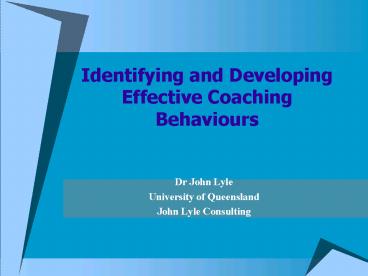Dr John Lyle - PowerPoint PPT Presentation
1 / 13
Title: Dr John Lyle
1
Identifying and Developing Effective Coaching
Behaviours
- Dr John Lyle
- University of Queensland
- John Lyle Consulting
2
Approach to the topic
- Spirit of workshop, debate, feedback
- Personal position prefer emphasis on coaching
practice - What can the researcher tell the coach very
little significant problems in investigating
effectiveness
3
Definitions / Assumptions
- Emphasis on performance coaching
- Effective coaching practice involves the
overseeing, planning and delivering of
appropriate sport performance - Effective behaviours may mean successful
coaching. Experts are by definition effective
over time - Having the capacity to be effective may not mean
that it is displayed all the time!
4
What is a behaviour?
- Antecedents
- Intentions
- Recipients
- Context
- Decision making
- Observable (versus cognitive behaviour)
- Means to an end
- Yes, we can identify behaviours through
systematic observation but significant limitations
5
Research / conceptual challenges
Discrete Practice Outputs Outcomes Behaviours C
oaching Behaviour Technical Standards Changes
Medals Tactical Results Changes Phys
ical Changes
FIVB
6
Research / conceptual challenges
- Behaviour/practice needs to be related to
outputs difficult because of variability,
complexity and inter-relatedness - Isolating behaviours is difficult
- Researchers cannot control athletes no RCT
- Sport specific nature of coaching behaviour
(triathlon versus rugby league) - Tendency towards intervention behaviour
7
Research / conceptual challenges
- There is a question of ideology over what are
effective behaviours (assumption of person
centred, athlete involvement, not authoritarian) - For example leadership behaviour has very mixed
findings, little useful, really a question of
preferred style, since all can be effective.
8
What are the key elements of coaching practice?
- Planning
- Decision making
- Technical knowledge
- Designing practice/drills
- Competition management
- Communication
- Meta analysis
- Modelling
- Regulating progress
- Monitoring
FIVB
9
How might we approach this issue?
- Attempt to design experiments into discrete
behaviours (doubt over validity of findings) - Accept that some behaviours are pedagogically
sound (e.g. positive feedback, empathise with
athletes).
Effectiveness is doing what is appropriate
(decision making/judgement) in the circumstances
(evidence), and having the capacity (knowledge
and skills) to carry it out.
10
Focus on good practice
- What do experts do? Must be Develop
- (good practice) effective expertise
- (application)
- Why? Education
- (Research) (Break into
- key elements)
FIVB
11
3 sets of ideas
- Meaningful practice
- Accept that many effective behaviours towards
same objective - Interaction tools for education simulations,
case studies
- Hard work
- Commitment
- Technical immersion
- Learning culture
- Supportive community
Expert Coach Effective Assistant
12
Conclusion
- A focus on good practice may be the best way
forward - Need to focus on application in context
- Dont be frightened of athlete performance as
output measure - Pedagogical case can be supported as
generalisation - Variation, ideology and athlete preferences are
important
13
Thank you for listening jlyle.consulting_at_btinterne
t.com

